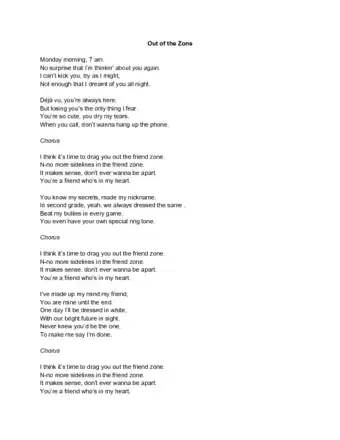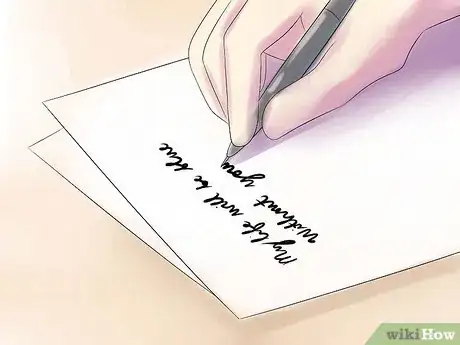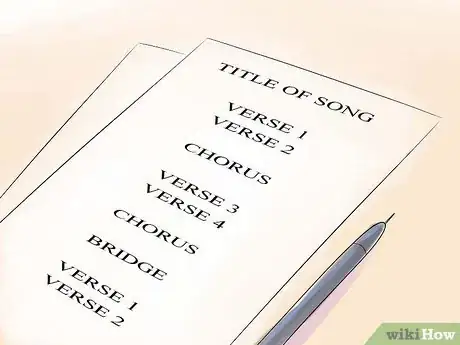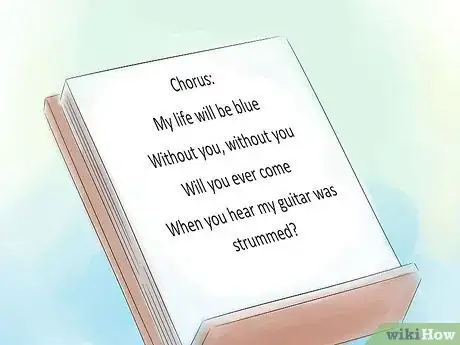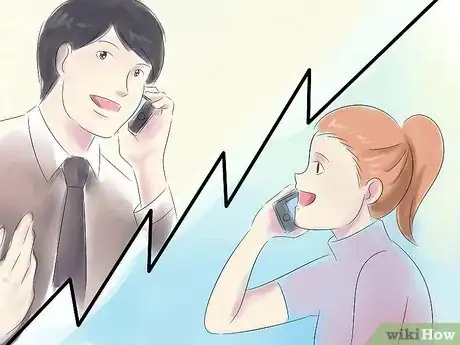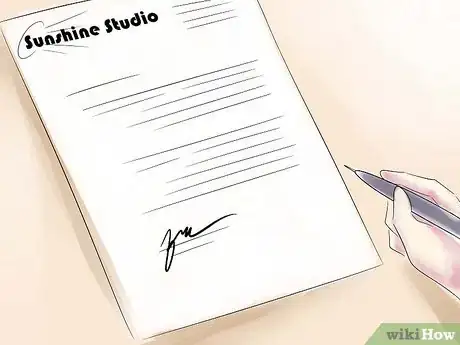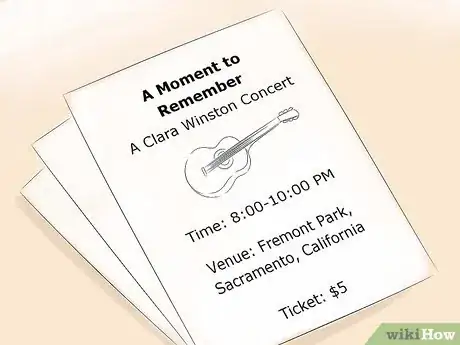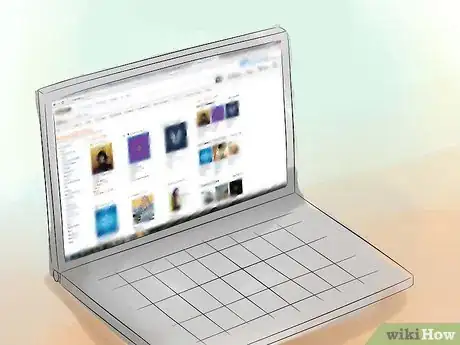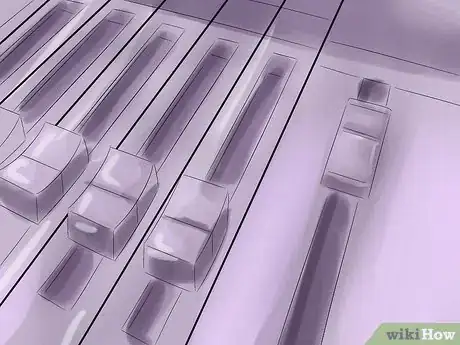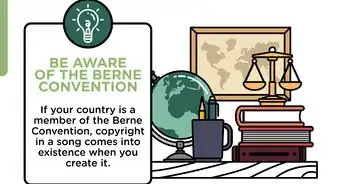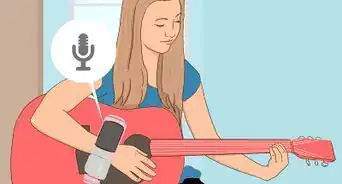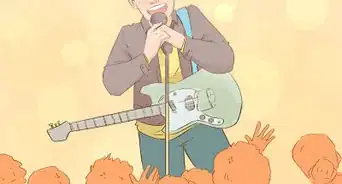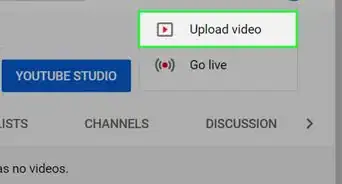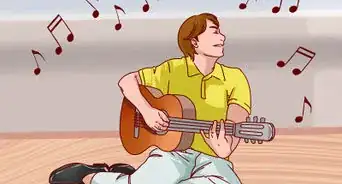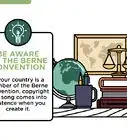This article was co-authored by Tanisha Hall. Tanisha Hall is a Vocal Coach and the Founder and Executive Director of White Hall Arts Academy, Inc. an organization based in Los Angeles, California that offers a multi-level curriculum focused on fundamental skills, technique, composition, theory, artistry, and performance at a conservatory level. Ms. Hall's current and previous students include Galimatias, Sanai Victoria, Ant Clemons, and Paloma Ford. She earned a BA in Music from the Berklee College of Music in 1998 and was a recipient of the Music Business Management Achievement Award.
wikiHow marks an article as reader-approved once it receives enough positive feedback. In this case, 100% of readers who voted found the article helpful, earning it our reader-approved status.
This article has been viewed 578,308 times.
Ever wonder why some songwriters get life-changing, rags-to-riches record deals while others with incredible talent and style seem to toil in obscurity? The crucial difference may be that one songwriter knows how to sell himself, while the other does not. Even the most visionary musicians may go unnoticed if they're not able to "get their music out there". Adding to songwriters' difficulties is the fact that today’s songwriting environment is a highly creative, competitive, and over-saturated one. Not only must songwriters get noticed - they must also differentiate themselves from countless other up-and-comers within their field and from existing mainstream acts. Read on below the jump to start learning how to clear these hurdles and start selling great songs.
Steps
Sample Documents
Writing Ear-catching Songs
-
1Write lyrics with emotional meaning. Though popular music can sometimes seem cookie-cutter (especially lyrically) in fact, there is no single "right" way to write song lyrics. Great song lyrics have been penned from an incredibly wide variety of personal viewpoints that run the entire gamut of human experience. Some songs are cheerful, others are furious. Some songs are laid-back and relaxed, others are tense and paranoid. Some carry great personal significance for the writer, while others are about nothing at all. However, nearly all great songs convey some sort of emotion. For starters, when you write songs, try to express the way you feel when you think about certain topics, events, or people that are important to you. Your lyrics don't necessarily have to mention these things directly, though they certainly can.
- Let's examine the opening lines of two songs - first, Elliott Smith's "Between the Bars" and, second, Kendrick Lamar's "Swimming Pools (Drank)". Both songs are about alcohol addiction. However, notice that they take two different approaches to the same topic, Smith opting for an indirect, referential approach and Lamar for a more direct one. Both successfully paint powerful emotional pictures.
- Between the Bars: Drink up, baby, stay up all night/With the things you could do, you won't but you might/The potential you'll be that you'll never see/The promises you'll only make
- Swimming Pools (Drank): Now I done grew up round some people living their life in bottles/Granddaddy had the golden flask backstroke every day in Chicago/Some people like the way it feels/Some people wanna kill their sorrows/Some people wanna fit in with the popular/That was my problem
- Let's examine the opening lines of two songs - first, Elliott Smith's "Between the Bars" and, second, Kendrick Lamar's "Swimming Pools (Drank)". Both songs are about alcohol addiction. However, notice that they take two different approaches to the same topic, Smith opting for an indirect, referential approach and Lamar for a more direct one. Both successfully paint powerful emotional pictures.
-
2Give your song a sense of structure. So, you've been thinking about things that make you feel strong emotions and writing down your thoughts in the form of lyrics. You're already off to a great start. Next, you'll need to organize your lyrics into some sort of song structure - decide which words go in the verse, which in the chorus, which in the bridge, and so on.[1] Many popular songs have lyrics that rhyme - if you want your lyrics to rhyme, you'll also need to decide on a rhyme scheme (the pattern by which your rhymes are arranged).Advertisement
-
3Compose instrumental backing music for your song. Once you've written your lyrics and organized them into a song, it's time to start thinking about how you'd like your song to sound. Again, there's no right way to write a song, but you may find it easiest to figure out your instrumental parts before tackling your vocal melody - this way, you'll be able to fit your vocals to a solid instrumental backing, rather than custom-composing instrumental parts to fit your vocal melody. Naturally, try to compose instrumental accompaniments that compliment the emotions conveyed by your lyrics.
- Songs' instrumental parts range in volume and intensity - some are overpowering "walls of sound", while others are so sparse that they're barely audible by comparison. For example, compare My Bloody Valentine's "Only Shallow" to Nirvana's "Polly". These two alternative rock songs were released within just months of each other, but their instrumentation couldn't be more different. "Only Shallow" is a massive, swirling juggernaut of distortion, while "Polly" is a dark, hushed composition, featuring just an acoustic guitar, Kurt Cobain's voice, a short bass interlude, and a few drum hits.
-
4Set your lyrics to a melody. In much of popular music, the singer's vocals are the central feature of each song, supported by the instrumental backing. Now that you have your song's lyrics and instrumental parts figured out, it's time to set your words to music. Give your lyrics a melody, or, perhaps more accurately, melodies - most songs have related, but distinct melodies for verses, choruses, etc. Though some musicians use the concept of discord (conflict between the notes or chords in a piece of music)[2] to great effect, generally, you'll want your vocal melody to be in an appropriate key for the chords of your song.
- It's certainly not impossible to become successful writing and selling a cappella songs (songs with only vocals and no instruments) or purely instrumental recordings. For instance, Shai's version of "If I Ever Fall in Love" is an a cappella song that spent time at #2 on the US charts. Similarly, the recent explosion in popularity of electronic dance music has made hits out of songs with few (if any) lyrics. However, the vast majority of popular music has both instrumentals and lyrics, so writing these types of songs may give you more mass appeal.
- Note that, if you're writing rap songs, you generally won't have to worry about vocal melodies, as "pure" rap vocals are delivered tonelessly. However, many hip-hop artists incorporate tonality into their songs in the form of sung refrains or half-sung, half-rapped verses. See Chance the Rapper's "Juice" for an example of this technique.
-
5Pay special attention to your song's chorus or hook. Many popular songs with uninspiring verses, tepid instrumentals, and laughable lyrics are saved by the power of a tremendous chorus (sometimes called the "hook"). Try to make the chorus of your song a particularly poignant, expressive, and concise set of lines. Generally, the chorus is the part of a song that people will remember the best, so make it emblematic of your song as a whole. Another way to tackle this is to think of your hook as your song's "thesis statement" - if you had to sum up the emotions behind your song in a few musical lines, how would you do so?
-
6Be passionate. Above all else, when writing a song, try to imbue your work with passion both musically and lyrically. Your songs should make you, as a performer, feel strong emotions - if you find yourself bored by your music, don't be afraid to start from scratch. Music is just as much a craft as it is an art - it's something to be honed and perfected with plenty of practice. The best way to motivate yourself to work at your songwriting craft, of course, is to be truly passionate about it.
-
1Play live gigs. Though some musicians (like, famously, The Beatles) have been able to transition away from live performance in favor of dedicating themselves entirely to studio work, very few, if any, have been able to become widely-known in the first place without ever performing live. To start building an audience and gaining recognition as a musician, it's important to put in work as a live act. To start, look for opportunities to perform in your local area.[3] Bars, clubs, and cafes are the "classic" proving grounds for up-and-coming musicians, but they're far from the only places where you can perform. Any place or occasion where people gather can conceivably be an opportunity to perform. Weddings, birthday parties, farmer's markets, and even street corners can be places to build your audience and sell your music.
- Don't be afraid to start small - all but the luckiest musicians paid their dues as local acts before making it big. One semi-recent example is Lady Gaga, who become a fixture of several NYC bars and nightclubs for several years in the mid-00's before getting her shot at the spotlight.
-
2Record your music. Nearly all serious musical acts should spend some time in the recording studio. Generally, in the studio, artists partner with a producer or engineer to create a finished product that's to their satisfaction. Recording your music gives you the opportunity to distribute it to your fans (in physical form as a CD or online as a file) in a polished, definitive form that's exactly how you want it.[4] It also gives you the opportunity to give your music to the types of people who can help you make money from your music - namely, record companies and industry scouts. If you haven't recorded any music yet, you may want to record a demo as your first move.[5] Demos are short (about 3-6 tracks) "mini-albums" that give you a chance to showcase your musical style - think of them as musical resumes for prospective employers.
- Meticulously practice your songs before you step into the studio. Studio time can be quite expensive, so you'll want to be able to record each song in as few takes as possible. The costs associated with lengthy studio sessions can quickly add up, so try to get to the point where you can play all of your songs in your sleep before you attempt to record them.
- For the same reason as you'll want to have your songs down pat before you enter the studio, you'll also want to avoid excessive experimentation in the studio. For instance, don't let a producer convince you to waste time trying out countless effects pedals. The place for experimentation and improvisation is in the practice room.
-
3Consider enlisting the help of a manager. Booking your own shows and studio time, negotiating your own contracts, and distributing your own music is time-intensive and requires a great deal of expertise. Because of this, many dedicated musicians decide to hire the services of a professional manager or booking agent to handle the business aspects of the music industry. Though this option may not be feasible with the average starving artist's budget, it can help a promising young artist maximize his or her potential and rise within the industry. Be sure that your manager is established and reputable - don't fall prey to scam artists.
-
4Reach out to record companies. When you've begun to gather a following and you've recorded a demo or two, you may want to try to sell yourself to record companies to win a recording contract. Though large, international record companies occasionally sign artists that are relatively unknown in terms of mainstream airplay (see: Epic Records signing experimental hip hop group Death Grips), obscure and up-and-coming artists may have more luck when courting smaller independent labels. Research labels that release the type of music you're interested in selling. Then, if they have a policy of accepting unsolicited submissions, feel free to send them demos, photos, interviews, reviews, biographies, and the like (if sent all together, these types of materials compose what is called a press pack, a standard method artists use to distribute their work and propagate their image).
- Of course, perhaps the best way to get noticed by a record company is to generate attention for yourself through groundbreaking music innovation, noteworthy live performances, and/or a unique image. In other words, if you're able to generate fame (or notoriety) without a record label, record labels may come to you.
-
5Look for unconventional opportunities to sell yourself as a musician. Performing your own songs in a live setting is important, but this is only one of the ways that musicians can gain professional clout. Musical artists can (and should) also try to find work as session musicians, soundtrack composers, and more - any opportunity to contribute music to another person's project or endeavor is chance to spread your name.
- One oft-overlooked opportunity for artists to create original music for profit is in the world of jingle-writing. Advertising agencies regularly employ musicians to compose and perform songs for commercials. In fact, several music production houses (called "jingle houses") specialize in the process, using in-house musicians to create jingles for their clients.[6]
- Especially when starting out, musicians may not have the luxury of being able to be picky with their employers. Don't worry too much about "selling out" - in some respects, it's part of the process of making your name as a musician. In fact, many now-famous performers with anti-authority bents originally took part in more "commercially friendly" music endeavors. Case in point: Tupac Shakur was originally a member of the light-hearted hip-hop group Digital Underground (of "Humpty Dance" fame).
-
6Build a distinct image. Music is a more competitive field today than ever before. With the advent of online music retail sources, contemporary musicians don't just have to compete with each other, but also with the stars of ages past whose music is just as available to consumers as their own. To stand the best chance of being able to sell yourself as a musician, it's important to make sure that you stand out from the pack of modern artists. Don't make music or perform in ways that can cause you to be confused with another artist. Instead, break the mold and forge an artistic image that's uniquely yours.[7]
- This advice extends to your music itself as well as to the way you perform. Take pride in the flourishes and idiosyncrasies that are unique to your performance. Many successful musicians, like Prince, Michael Jackson, Freddie Mercury, and countless others, had and/or have performance styles that are unforgettably indelible. The clothes you wear, the way you carry yourself onstage, and the way you play your songs all combine to create your image as a performer, so take time to develop these aspects of yourself as an artist.
-
7Promote yourself. Whether you're playing live shows or trying to move copies of your latest album, it's almost always in your best interest to reach out to as many people as possible. Advertise yourself as a musician using every method at your disposal - word of mouth (for instance, if you teach music part-time, try telling your students about an upcoming concert at the end of their lessons), self-advertising (flyers, etc.), and even cross-promotion with local radio stations are great ideas for promoting yourself. Also be sure to take advantage of your online visibility. Nowadays, a well-timed social media "push" can be a much more effective and efficient way to reach your fan base than conventional advertising.[8]
- The humble flyer is a well-worn method by which musicians self-promote. These can be easily massed-produced for relatively cheap with nothing more than a basic computer and a printer. Be sure your flyer includes any information your audience will need to attend your upcoming event - time, place, date, and admission price are essential. Also ensure your flyer is somewhere it will be noticed, such as a live music venue, bar, coffee shop, or college campus.
-
8Market your songs in-person and online. No matter how good they are, your songs won't ever sell themselves. Use every performance as an opportunity to sell songs - either by reminding your audience that you have physical CDs for sale or by directing them to a personal webpage, etc. Don't shrink from selling your music. If you put on a good show, you deserve whatever money you make from selling your music - you're not selling out by giving your audience the chance to support you.
- The internet offers plenty of exciting opportunities for musicians to share and sell their music. Social networking sites like Facebook and Twitter let musicians keep in touch with their fans and notify them of new songs and live performances. Also, sites such as GarageBand and Soundcloud offer the opportunity for artists to host and even sell their actual music online.
- Some recent artists have actually managed to become breakout successes primarily through the internet. For instance, Justin Bieber's path to stardom began when a record industry executive accidentally clicked one of Bieber's online videos by accident.
- The internet offers plenty of exciting opportunities for musicians to share and sell their music. Social networking sites like Facebook and Twitter let musicians keep in touch with their fans and notify them of new songs and live performances. Also, sites such as GarageBand and Soundcloud offer the opportunity for artists to host and even sell their actual music online.
-
9Pay attention to the production values of your music. You have probably noticed that, today, most of the songs on the radio sound somewhat alike in terms of their sleek, flawless production style. This is a deliberate choice on the part of the songs' creators. A song's production values are a serious factor to consider before releasing it to the public - minor flaws like missed notes, background noise, and noticeable transitions between separate takes can become glaringly obvious with repeated listens. Though there's certainly a market for music with a lo-fi aesthetic, the market for sleek, polished recordings is undeniably bigger. So, at the very least, be sure to consider whether your music's production values suit your professional goals.
- Some musicians have the experience and know-how to produce their own music - Kanye West and some of his peers in the world of hip-hop, for instance, produce many of their own songs. However, many musicians don't know how to "work the boards", so to speak. If you fall into this group, consider paying for studio time with a professional producer, who will be able to help you record and mix your music as professionally as possible.
-
10Never let the industry take advantage of you. Unfortunately, the music industry has a history of taking advantage of well-meaning musicians' kindness. Always be aware that unsavory tour managers, record labels, venue owners, concert promoters, and the like may be out to get you. Never let someone you don't know entangle you in a vague or poorly-defined agreement. Don't agree to work for free as a musician for the "possibility" of pay at a later date. Don't exchange your self-agency for the promise of fame. Don't let any managers or staff you employ make decisions for you without your consent. As a general rule, try to remain guarded as you navigate the music industry. Though many of the people in the industry are completely honest and ethical, all it takes is one legally-binding agreement with a bad apple to completely sideline your music career.
- Contracts are a must. Oral agreements, even with people you're close with, aren't easily enforced. Always get any agreement you make in writing. If you're being asked to sign a significant binding agreement (like, for instance, a record deal), get the counsel of an experienced lawyer before signing.
Expert Q&A
-
QuestionHow do I build an initial fan base?
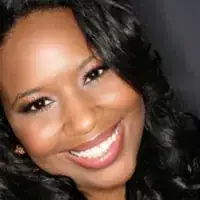 Tanisha HallTanisha Hall is a Vocal Coach and the Founder and Executive Director of White Hall Arts Academy, Inc. an organization based in Los Angeles, California that offers a multi-level curriculum focused on fundamental skills, technique, composition, theory, artistry, and performance at a conservatory level. Ms. Hall's current and previous students include Galimatias, Sanai Victoria, Ant Clemons, and Paloma Ford. She earned a BA in Music from the Berklee College of Music in 1998 and was a recipient of the Music Business Management Achievement Award.
Tanisha HallTanisha Hall is a Vocal Coach and the Founder and Executive Director of White Hall Arts Academy, Inc. an organization based in Los Angeles, California that offers a multi-level curriculum focused on fundamental skills, technique, composition, theory, artistry, and performance at a conservatory level. Ms. Hall's current and previous students include Galimatias, Sanai Victoria, Ant Clemons, and Paloma Ford. She earned a BA in Music from the Berklee College of Music in 1998 and was a recipient of the Music Business Management Achievement Award.
Vocal Coach Work on becoming a star in your hometown. Everybody in your hometown should know you before you try to reach out and take over the world. You should be singing at every single football game, basketball game, bar mitzvah, every spring fling, every single event that your town has. You should be that national anthem person. Work to get the support of your local community and then branch out to your regional community—that's how you build your initial fan base and your following.
Work on becoming a star in your hometown. Everybody in your hometown should know you before you try to reach out and take over the world. You should be singing at every single football game, basketball game, bar mitzvah, every spring fling, every single event that your town has. You should be that national anthem person. Work to get the support of your local community and then branch out to your regional community—that's how you build your initial fan base and your following. -
QuestionCan anyone at any age write a song?
 Community AnswerYes. You need to have a good tune and lyrics, but at any age you can write a song.
Community AnswerYes. You need to have a good tune and lyrics, but at any age you can write a song. -
QuestionIs it possible to sell music under the age of 18?
 Community AnswerIt is possible, but you will need a parent or guardian to sign the contract for you.
Community AnswerIt is possible, but you will need a parent or guardian to sign the contract for you.
Warnings
- Try not to get too cocky with your songs or you'll get disappointed if your song doesn't sell.⧼thumbs_response⧽
References
- ↑ https://www.learneverythingabout.com/lyrics/song-structure.html
- ↑ https://musicterms.artopium.com/d/Discord.htm
- ↑ Tanisha Hall. Vocal Coach. Expert Interview. 27 March 2020.
- ↑ Tanisha Hall. Vocal Coach. Expert Interview. 27 March 2020.
- ↑ http://blog.sonicbids.com/5-crucial-rules-for-recording-a-demo
- ↑ http://blog.discmakers.com/2011/11/12-tips-for-writing-and-selling-great-jingles/
- ↑ https://www.edmprod.com/on-making-it/
- ↑ Tanisha Hall. Vocal Coach. Expert Interview. 27 March 2020.
About This Article
Thanks to the internet, writing and selling your songs has never been easier. Aim to write songs that are emotional and have a catchy chorus, which will engage more people. If you write lyrics, make them relatable so more people will connect with your music. Once you’ve written your songs, work with a producer to record and mix your songs to a professional standard. Then, look for a manager to help you sell your songs. Or, use online marketplaces where you can sell your beats and songs to other independent artists. You can also upload samples to websites like Soundcloud to grow an audience. The more fans you have for your music, the higher demand there will be for your songs. For more tips, including how to build a distinct image as a songwriter, read on!
